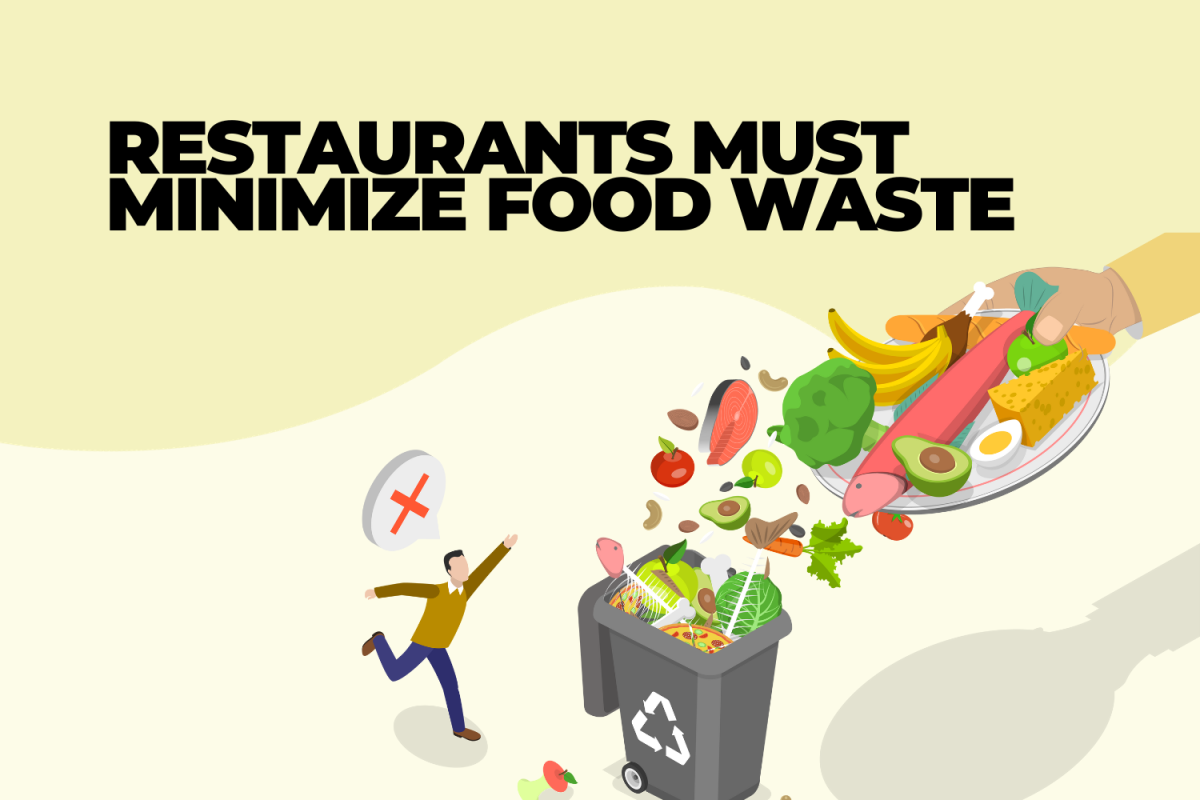At the end of my meal at my local pizza restaurant, I got up from my chair and watched as the kitchen door revealed a worker throwing away cartons of milk, slightly bruised fruits, and loaves of bread. The bags of food kept filling up, and I was horrified at how much food was being thrown away.
This was one of many restaurants that are making an effort to help in the global fight against food waste, exposing the industry’s ignorance and dismissal of drastic environmental consequences.
According to GreenMatch a restaurant in the U.K. can waste up to 25,000 to 75,000 pounds of food per year. The magnitude of food waste significantly contributes to the world’s ever-growing landfills which have detrimental effects on both the environment and society. According to the World Wildlife Fund, most discarded food ends up in landfill sites, where it rots and releases the greenhouse gas methane – a massive contributor to global warming. Approximately 7% of greenhouse gas emissions caused by humans could be eliminated if food waste stopped. With both world hunger and rising atmospheric and ocean temperatures, waste is an increasingly prevalent problem. Therefore, it is essential that restaurants begin to make an effort to prevent it.
Moreover, the production of lost or unused food in the U.S. causes the same amount of emissions as 32.6 million cars, according to WWF. The restaurant industry and aspiring service industry workers must be aware of the significant contribution of waste to climate change. They must realize that their profits should not take precedence over a worldwide issue, so food wastage can be stopped and restaurants’ contribution to the ever-growing climate crisis can decrease.
Minimizing food waste would not only benefit the environment but also the profits of restaurants because wasted food represents lost profits. According to Waste Managed, food waste collectively costs restaurants in the U.K., £682 million annually. Restaurants that are not attentive to their purchases of surplus food later end up wasting it.
Restaurants buy too much food, causing it to end up unused. By implementing effective food waste reduction strategies, restaurants can cut costs and improve their financial sustainability. These savings could be used to be invested in other areas of the business, such as improving food quality or expanding menu options.
Restaurants are also overproducing food due to high demand or overestimated portion control. Too often, I witness and contribute to food waste at restaurants due to the portion sizes of the meals I am ordering being too big, and I am not able to finish all of the food. When restaurants serve far too much food for their customers to eat, customers leave large portions of their meals untouched, ultimately wasting what is left on the plate.
While food is being wasted in abundance, many people worldwide go hungry. According to Thin Ink, enough food is produced globally for 1.5x the world’s population, yet it is not distributed properly, and around 828 million people around the world are starving. Restaurants are throwing away food that is still edible, which could be given to people in need. According to Business Waste, the U.K. throws away around 9.5 million tons of food waste annually while 8.4 million people in the U.K. are in food poverty. One way the restaurant industry can minimize wasting food is to redirect suitable food to those in need through numerous associations such as food banks and shelters.
Furthermore, the amount of anti-food waste guidelines is disappointing and fails to address the climate crisis. Restaurants have few legal limitations surrounding food waste. According to Don’t Waste Services, food waste in restaurants is loosely regulated by the Environmental Act of 2021. This legislation aligns with the U.K. government’s dedication to eliminating waste being sent to landfills. Despite this effort, the U.K.’s annual food waste average has not changed since 2018.
By embracing a commitment to curb food waste, the restaurant industry can not only enhance its sustainability but also actively participate in global initiatives aimed at tackling food waste challenges. Restaurants must proactively combat food waste by prioritizing monitoring stock inventories, avoiding excessive product purchases, attuning to consumer habits, and aligning their stock procurement accordingly.
It is time for restaurants to view minimizing food waste as not just a policy but a responsibility: one that benefits their business as well as the entire world.











